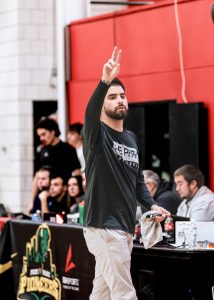Dean and artistic director of Pittsburgh Playhouse defends COPA schedule changes
January 25, 2023
Garfield Lemonius, dean and artistic director of the Pittsburgh Playhouse, defended the decision to schedule all COPA productions as one weekend performances.
“As far as I know, there is no widespread criticism about the changes, and it appears that [criticisms] are coming from a small group of students,” Lemonius said in an interview with The Globe. “We take these concerns very seriously, and we want to hear from our students and make sure that they are heard. Their feedback is integral to potential changes that can be made.”
According to Lemonius, part of the reason the scheduling changes were made was to better accommodate the needs of students.
“It’s important to remember that performers also have responsibilities with class,” Lemonius said. “We want to make sure that mental health is also paramount, and that people are getting the rest that they need so they can do their best jobs and put their best selves forward.”
Madelyn Miessmer, a junior theater productions major, previously spoke with The Globe about the scheduling changes. Miessmer was in support of the change, citing personal burnout from being involved in multiple productions.
“I had worked on a few shows prior that were two-week runs, and truthfully they can be a bit much,” Miessmer said. “It’s also less time for technicians to have to be there for each show, so I personally was okay with going down to one week.”
Noah Glaister, a senior theater production major, told The Globe that he disagrees with the scheduling changes.
“Everyone puts all of their hard work into producing a show for one weekend and to have to tear it down in nine days is not worth it at all,” Glaister previously said to The Globe.
While the changes mean that they are putting on fewer shows, they have not halved the productions. Two-weekend runs would have eight shows, and one-weekend runs currently have six shows.
Lemonius explained that the Playhouse, like the theater world as a whole, is still recovering from the COVID-19 pandemic.
“COVID has had a dramatic impact on the performing arts world,” Lemonius said. “Many arts professionals have left the business, but there is still the opportunity to come out of this crisis.”
Alongside the scheduling changes, the Playhouse introduced a series of presented works from outside organizations.
Patrick Costello, a junior technical design major, feels as though these outside events hurt COPA students.
“This year, what they’re doing is bringing in a lot of outside events, which is taking us away from working on stuff that we’re supposed to be working with and that we’re paying to work on as students,” Costello previously said to The Globe.
Lemonius feels the opposite and referred to the outside production works as “educational” for students.
“Bringing a professional organization into an educational environment allows our students to witness these professionals doing what they do,” Lemonius said. “The goal of the students, after they leave Point Park, is to be a part of the performing arts industry and to become professionals. By welcoming them into our spaces, head on, [students] get to see what life can be like after Point Park.”
According to Lemonius, performers from outside productions visit classes and hold workshops for students.
“It’s not just observation; it’s also engagement because they’re engaging with these professional organizations when they are here on campus,” Lemonius said. “Whether it’s through workshops, whether it’s guests in classes, whether it’s behind the scenes working shoulder to shoulder with some of the technical production folks… you can’t put a price tag on that.”
According to Lemonius, he hopes that the Pittsburgh Playhouse will become a place where “all segments of the population in the city of Pittsburgh” are able to attend and that “all folks will feel like it is a space that they are welcome.”
Going forward, Lemonius hopes to continue to grow the Playhouse. According to him, priorities include improving marketing and social media presence, as well as hosting the Cinema Department’s year-end production screenings in the Playhouse.
The Pittsburgh Playhouse’s performance schedule is available on their website, as well as the university’s.


















